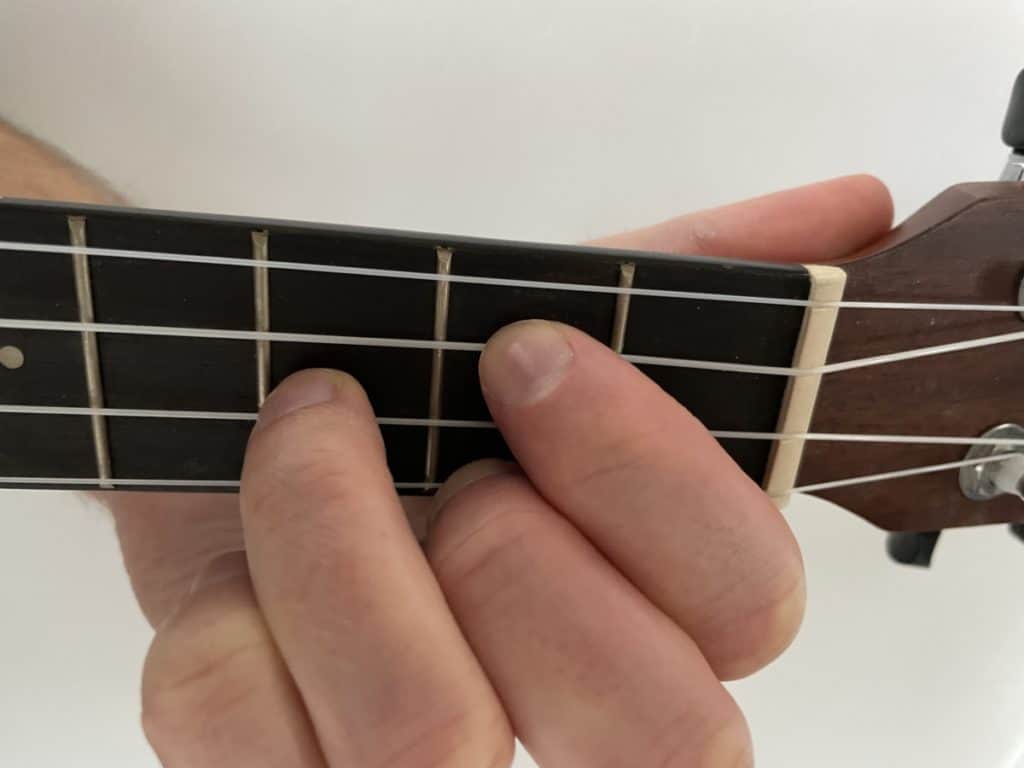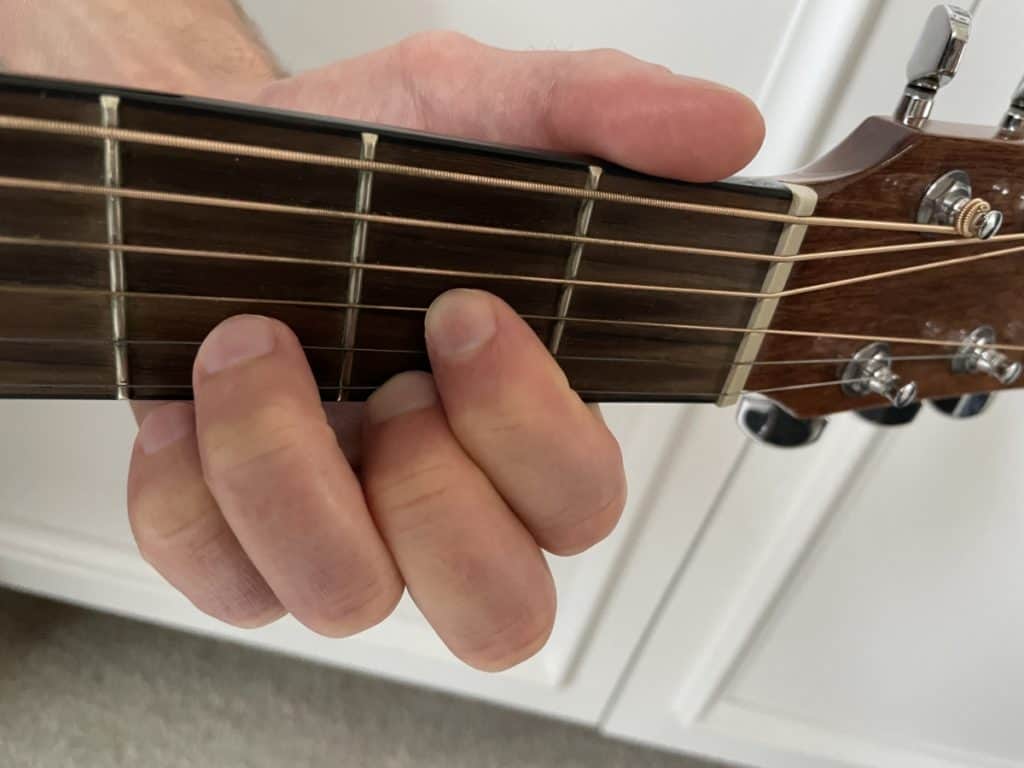Today I’m going to explain the differences between ukulele and guitar strings, and whether or not they are interchangeable.
I personally play both ukulele and guitar, and have one of each instrument sitting right next to me as I write this.
Let’s get straight into it, starting with the most common question I see related to this topic.
Can You Use Guitar Strings on a Ukulele?
You should never use standard steel guitar strings on a soprano or concert ukulele (which are the most popular ukulele sizes). These ukuleles can’t withstand the tension of steel strings and would likely bend or break. However, you may be able to use nylon guitar strings if the diameter is correct.
For example, D’Addario is a popular manufacturer of both ukulele and guitar strings. They produce nylon ukulele strings with the following diameters:
D’Addario Nylon Ukulele Strings
| G | C | E | A |
| 0.024 | 0.032 | 0.034 | 0.028 |
Keep an eye on the above green highlighted numbers.
Now here are the string diameters for a set of D’Addario nylon guitar strings.
D’Addario Nylon Guitar Strings
| E | A | D | G | B | E |
| 0.043 | 0.035 | 0.029 | 0.0403 | 0.0322 | 0.028 |
There it is. Did you catch it?
In theory, you could substitute the B and E nylon guitar strings here, for the C and A strings on a ukulele.
With that said, it leaves you with your problem only half solved, because you have nothing to replace your ukulele’s G or E strings.
And more importantly, it’s really not worth the hassle. Buying a set of good ukulele strings is super cheap, and then you don’t have to hurt your brain comparing all these string diameter numbers.
And if that wasn’t enough to convince you just to buy strings that are made specifically for your ukulele, there are some additional differences between the two, which I’ll highlight next.
4 Differences Between Ukulele and Guitar Strings
Here’s a picture of my ukulele with pretty typical nylgut strings installed:

Here’s a picture of my guitar, with pretty typical steel strings installed:

By looking at these photos, you can probably immediately notice a few differences, but let’s dig deeper into a few of the most important differences:
1. String Size (i.e. Gauge)
I already covered this in the previous section, but I’ve listed it again here for completeness.
Overall, ukulele strings are typically going to have different diameters than guitar strings. Trying to get the sizes to match up is a bit of a hassle, and it will probably only replace 2 of the 4 strings that you’ll need for a typical ukulele.
And that’s a good segway to difference number two:
2. Number of Strings
Most ukuleles have a different number of strings than guitars. This is important, because if you’re looking to replace strings, you’ll need 4 new strings for a standard ukulele and 6 new strings for a standard guitar.
To be fair, 6 string ukuleles do exist, but they are quite rare.
3. Materials
Personally, I think this is the most interesting difference between ukulele and guitar strings.
The materials used to make them are VERY different.
The most popular material for making ukulele strings is called nylgut or nyltech, which is a synthetic nylon material designed to mimic traditional gut strings. You can learn more about the variety of materials used in ukulele strings in my what ukulele strings are made of article.
On the other hand, guitar strings are usually made from metal strings. This affects several things, including the following:
- The tone and timbre of the instrument
- How much the strings wear out your hands and fretboard
- How long the strings last
4. Wound vs. Not Wound
A lot of people don’t know about this one, but ukulele strings are usually not “wound” whereas the 4 lowest strings on a guitar are almost always “wound”.
For example, on the low E string of a guitar, there is a steel core wire. Then that core wire is wrapped in an additional metal ‘thread’, which is usually made of some type of copper blended alloy.
That’s why the low strings on a guitar have a bronze color to them: they are wrapped in a copper alloy. If you look closely, you can also see the tiny lines of the wrapped metal. See if you can catch it in this photo:

However, ukulele strings are usually just one piece, without a second material wrapped around on the outside.
There are exceptions to this rule though, and sometimes larger ukuleles (like tenor or baritone) can be played with wound strings. But, since most people use soprano or concert ukuleles, I think it’s fair to say that “wound” strings are another key difference between guitar and uke strings.
Are Ukulele Strings Softer than Guitar Strings?
Now, a closely related question that’s super common among new ukulele players, is whether the strings are actually softer on your hands than guitar strings.
As someone who plays both instruments, here’s my take:
Typical synthetic ukulele strings are considerably softer on your hands than standard metal guitar strings. If you were to play a ukulele and guitar with the same amount of finger pressure, your fingers would start to hurt much earlier on the guitar strings.
The reason ukulele strings are easier on your fingers, simply comes down to the materials they’re made out of.
The nylon or fluorocarbon plastics in ukulele strings dig into your skin a lot less than the steel, copper or other metals that guitar strings are usually made out of.
For anyone who’s worried about sore hands, I think it’s also worth mentioning that a guitar will probably also give you hand strain more quickly, because the neck of the guitar is longer than the neck of a ukulele, meaning you’d have to stretch farther to create the same chords.
Don’t get me wrong, I love both instruments, just something to keep in mind.
Should You Use Guitar Strings on a Ukulele?
To summarize:
You should almost never use guitar strings on a ukulele. Steel guitar strings are likely to bend or even snap the neck of a ukulele. Nylon guitar strings may be compatible with a ukulele’s C and A strings, but matching the string sizes can be a hassle. The best solution is just to get new ukulele strings.
That’s my 2 cents anyway. I hope you’ve found this helpful 🙂